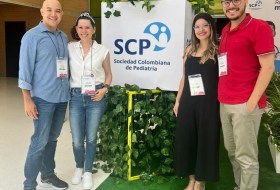News
Research on breastfeeding and neonatal mortality receives recognition at the National Congress of Pediatrics.
The project called "Causal Effect of Birth Hour on Neonatal Morbidity and Mortality: Cohort Study" aims to highlight the urgent need to strengthen clinical services during nighttime hours and further study the determining factors behind this increased risk.
During the 33rd National Congress of Pediatrics held last July in Barranquilla, an innovative study titled "Causal Effect of Birth Hour on Neonatal Morbidity and Mortality: Cohort Study" was presented. This research was conducted by the Breastfeeding and Complementary Feeding Research Group from the Department of Pediatrics and the Cochrane Affiliate Center at the University of Cauca, in inter-institutional collaboration with the Cochrane Associated Center at the University of Antioquia (Cochrane Colombia Collaboration).
This study, which analyzed over 60,000 records of newborns in the Cauca department, explored whether being born at night directly causes neonatal morbidity and mortality. Its findings emphasize the pressing need to strengthen clinical services during nighttime hours and continue studying the factors determining this increased risk. Professor Ginna Paola Cabra, from the Department of Pediatrics and leader of this project, explains that the only way to strengthen large-scale research is by building and maintaining collaboration networks with diverse stakeholders.
This project was led by Pediatrics program residents: Andrés Felipe Pérez and Gissel Viviana Ruiz. It received methodological and analytical support from professors José Andrés Calvache, affiliated with the Department of Anesthesiology at the University of Cauca, in conjunction with Iván D. Flórez and Daniel Camilo Aguirre from the Department of Pediatrics and the Institute of Medical Research at the Faculty of Medicine of the University of Antioquia.
The 33rd Colombian Congress of Pediatrics, held on July 6th, 7th, and 8th, 2023, in Barranquilla, provided a platform where attendees had the opportunity to participate in a wide variety of conferences and symposia delivered by leading experts from Colombia and Latin America.
Cochrane Colombia is supported by four affiliated centers located in different universities across the country, providing methodological support to authors of Systematic Reviews within their sphere of influence. Its members engage in and support various training, production, and use of Cochrane evidence activities promoted by associated centers. The Faculty of Health Sciences at the University of Cauca is one of these affiliated centers and has active members within the Cochrane Collaboration.


